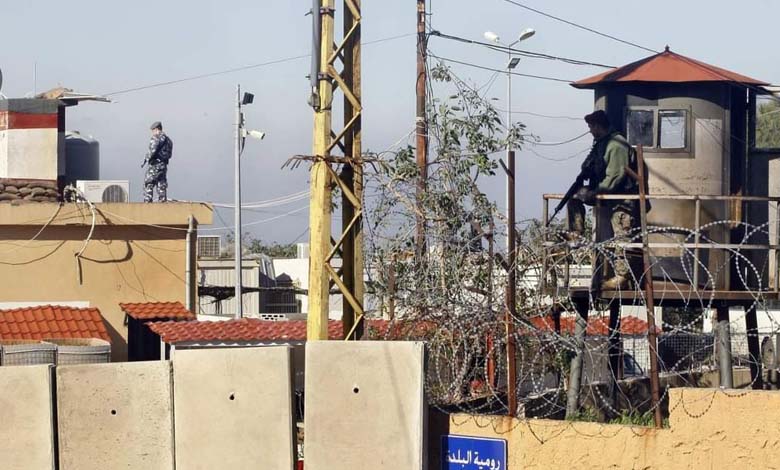Lebanese Plan for Deporting Syrian Prisoners
Field movements and a social media campaign aim to push for the immediate return of displaced persons, as human rights warnings about "cleansing" and "forced disappearance" escalate

The head of Lebanese General Security, Elias Bassil, announced that “the relevant authorities are preparing a plan to facilitate the deportation of a number of Syrian prisoners,” with this issue dominating political and legal discussions in Lebanon, and with an increasing popular and political campaign demanding the deportation of all refugees and the reintroduction of the term “Syrian occupation” in discussions on social media.
Bassil stated in statements reported by the Lebanese newspaper “Al Joumhouria” that he is “preparing a plan to facilitate the deportation of a number of prisoners in coordination with the Minister of Justice and the Discrimination Public Prosecution, under the supervision of the Minister of the Interior,” adding that “amendments are being prepared by the General Security Directorate regarding residency conditions for residents.”
The new amendments will tighten the application of residency conditions, including the imposition of strict penalties on any Syrian who violates residency conditions or Lebanese laws, including immediate deportation if they breach those conditions.
The head of Lebanese General Security indicated that the plan he is preparing for the Syrian refugee file “will be detailed and presented at the conference discussing the Syrian displaced persons issue in Brussels next month.”
During the latest consultative session in which ministers discussed the possibility of deporting Syrian prisoners, numbering around 2700, there was debate over whether, even if they were deported, they would return through unofficial border crossings. However, one minister commented, saying that the Lebanese state should fulfill its duties and not use the excuse that they will return, regardless of whether they “come back through the window.”
The minister commented during the session that the state should return them to Syria two or three times, and each time they try to return because the criterion is the same, i.e., based on legal entry and illegal presence, and their entry must be in accordance with the rules through legal crossings.
Many Lebanese political parties continue their efforts to deport Syrian refugees in practice and on social media, and the Lebanese site reported, citing sources from the “Free Patriotic Movement,” that the protest movement against the policies pursued in the displacement file is nothing but the beginning of field and qualitative movements for the movement, aimed at promoting law enforcement and pushing towards immediate return.
He emphasized that the experience of the “movement’s” cadres and youth with the street encourages continued movements, alongside continuous diplomatic and political campaigns internally and externally.
He emphasized that the context of the movement of the current is consistent with its policies and positions since 2011, and that the increasing Lebanese convergence to face the consequences of displacement only confirms the correctness of its approach to the file.
Lebanese authorities seek to implement measures related to the Supreme Defense Council decision of 2019, which stipulates in one of its clauses the possibility of immediately handing over detainees and convicts to the Syrian regime, which has raised fears among Syrian opposition detainees of “cleansing” and “forced disappearance” if the Lebanese authorities implement the decision.
Member of the “Strong Lebanon” bloc, MP Georges Atallah, announced about the nature of the meeting with President Nabih Berri and its results: “We were influenced by what was announced during the meeting between Prime Minister Najib Mikati, the Cypriot President, and the President of the European Commission, and we informed President Berri that there is a deception regarding the return of the displaced, as we are not asking for an increase in the amount of one billion euros to two or five billion, but we consider that the European grant is a step to cement the presence of the displaced in full and permanently in Lebanon, which we reject.”
He announced that the “Strong Lebanon” bloc will continue its tours with all those concerned with the displacement file to explain its dangers and means of resolution, and a delegation from the bloc will visit the European Parliament in Strasbourg to explain the situation. Fortunately, there is political consensus, as Berri noted on the need to address this issue, but in our opinion, intentions must be accompanied by actions.”
Opposition sources from Syria state that Roumieh Prison houses around 400 Syrian prisoners, some of whom are defectors from the regime forces or fought in the ranks of the “Free Army” previously during the battle of Qusayr, and some were forced to admit their affiliation with extremist organizations, while others were arrested during the “Arsal battle,” while others were arrested due to similarities in names.
For many prisoners, returning to Syria means the unknown or execution, and Lebanese news sites were filled with reports of four Syrian prisoners (including two brothers) attempting suicide in March last year by hanging themselves with blankets inside Roumieh Central Prison in Lebanon, protesting against the deportation of a prisoner (brother of the two brothers) to Syria by the Lebanese General Security, after serving a ten-year sentence for terrorism charges.












